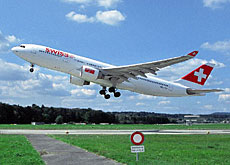The Economist gives Switzerland a health check

The respected news weekly, “The Economist”, is publishing a special supplement on Switzerland, which is due to hit newsstands on February 13.
The 20-page special takes a look at the political and economic peculiarities of a country that still in many ways remains a law unto itself.
Author Barbara Beck interviewed a cross-section of politicians, business and banking leaders, administrators and academics to build a picture of Switzerland today.
She concludes that while the small, landlocked country of seven million has done “remarkably well”, Switzerland is no longer the “island of calm” it once was.
“In an interconnected world, even a small country cannot escape geopolitical changes and global economic trends,” writes Beck.
“This has meant that in recent years Switzerland has in many ways become less of a special case.”
The Economist notes that the alpine nation’s squeaky-clean image has taken a battering, not least because of neutral Switzerland’s behaviour during and after the Second World War.
Revelations that the Swiss bought Nazi gold, turned back Jews at the border and were slow to act over dormant Holocaust-era bank accounts left a bitter taste in many mouths.
Politics
The Economist also tries to put into perspective the recent gains made by the rightwing Swiss People’s Party, which caused a stir at home and abroad.
It points out that the party is not a new political force and has held a seat in cabinet since 1959.
“What is new is the much more strident nationalist tone… and the voters’ enthusiastic response to it,” writes Beck.
She also tackles Swiss federalism and direct democracy, plus the thorny issue of closer integration with the European Union.
Beck argues that with Switzerland’s decentralised political system and strong direct democracy alive and well, Brussels is likely to be kept at arm’s length for some time to come.
“Whatever cabinet or parliament says, the ultimate judge on all big decisions will still be the one and only Swiss sovereign: the people.”
Economy
The Swiss once enjoyed the highest per capita income in the world but they have been overtaken in recent years by the citizens of Luxembourg, Norway and the United States.
But, as The Economist points out, it is not that Switzerland is getting poorer – other countries are getting richer faster.
Recent growth rates in Switzerland have been low and unemployment is high but only relatively speaking.
However, according to Ulrich Kohli, chief economist at the Swiss National Bank, the low growth rate of the past two decades is “something of an optical illusion”.
Higher costs
Rising public spending, a bigger social security bill and lower labour productivity have had a dampening effect on the economy, states The Economist.
But the nation manages to hold its head above the water, despite its “split personality” economy – an efficient export sector and an inefficient domestic sector.
In the former category belong multinational companies, such as Nestlé and Novartis, as well as big banks such as UBS and Credit Suisse; in the latter can be found the farmers who enjoy the highest government subsidies in Europe but are not productive.
The Economist says that some sectors of the economy could do with a shake-up but insists that, on the whole, things are not as bad as the Swiss might believe.
swissinfo, Faryal Mirza
The Economist says Switzerland is no longer the special case that it once was, as the country increasingly has to keep pace with a changing world.
But while fundamental reforms are needed in some sectors of the economy, it says the country appears to be ticking along in its own idiosyncratic way.
The magazine notes the rise of the rightwing Swiss People’s Party and questions whether Switzerland really needs a national carrier.

In compliance with the JTI standards
More: SWI swissinfo.ch certified by the Journalism Trust Initiative











You can find an overview of ongoing debates with our journalists here . Please join us!
If you want to start a conversation about a topic raised in this article or want to report factual errors, email us at english@swissinfo.ch.